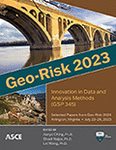A Comparative Study of Ensemble Methods for Prediction of Surface Settlement Induced by TBM Tunneling
Publication: Geo-Risk 2023
ABSTRACT
The purpose of this study is to apply ensemble methods to predict surface settlement induced by earth pressure balance tunnel boring machine. Random forest (RF) and Extreme Gradient Boosting (XGBoost) algorithms are applied on 1,101 settlement measurements collected from the Grand Paris Express project. The results are compared with the performance of the back-propagation artificial neural networks (BPNN). Finally, the results show that both ensemble methods XGBoost and RF are better than BPNN based on R² and RMSE indicators.
Get full access to this article
View all available purchase options and get full access to this chapter.
REFERENCES
Baghbani, A., Choudhury, T., Costa, S., and Reiner, J. (2022). Application of artificial intelligence in geotechnical engineering: A state-of-the-art review. Earth-Science Reviews, 228(March), 103991. https://doi.org/10.1016/j.earscirev.2022.103991.
Breiman, L. (2001). Random Forests. Machine Learning, 45, 5–32. https://doi.org/10.1023/A:1010933404324.
Chen, R.-P., Zhang, P., Kang, X., Zhong, Z.-Q., Liu, Y., and Wu, H.-N. (2019). Prediction of maximum surface settlement caused by earth pressure balance (EPB) shield tunneling with ANN methods. Soils and Foundations, 59(2), 284–295. https://doi.org/10.1016/j.sandf.2018.11.005.
Chen, T., and Guestrin, C. (2016). XGBoost: A Scalable Tree Boosting System. Proceedings of the 22nd ACM SIGKDD International Conference on Knowledge Discovery and Data Mining, 13-17-Augu, 785–794. https://doi.org/10.1145/2939672.2939785.
Liu, L., Zhou, W., and Gutierrez, M. (2022). Effectiveness of predicting tunneling-induced ground settlements using machine learning methods with small datasets. Journal of Rock Mechanics and Geotechnical Engineering, 14(4), 1028–1041. https://doi.org/10.1016/j.jrmge.2021.08.018.
Pedregosa, F., et al. (2011). Scikit-learn: Machine Learning in Python. Journal of Machine Learning Research, 12, 2825--2830. www.scikit-learn.org.
Su, J., Wang, Y., Niu, X., Sha, S., and Yu, J. (2022). Prediction of ground surface settlement by shield tunneling using XGBoost and Bayesian Optimization. Engineering Applications of Artificial Intelligence, 114(June), 105020. https://doi.org/10.1016/j.engappai.2022.105020.
Suwansawat, S., and Einstein, H. H. (2006). Artificial neural networks for predicting the maximum surface settlement caused by EPB shield tunneling. Tunnelling and Underground Space Technology, 21(2), 133–150. https://doi.org/10.1016/j.tust.2005.06.007.
Zhang, P., Wu, H. N., Chen, R. P., and Chan, T. H. T. (2020). Hybrid meta-heuristic and machine learning algorithms for tunneling-induced settlement prediction: A comparative study. Tunnelling and Underground Space Technology, 99(May 2019), 103383. https://doi.org/10.1016/j.tust.2020.103383.
Information & Authors
Information
Published In
History
Published online: Jul 20, 2023
ASCE Technical Topics:
- Algorithms
- Artificial intelligence and machine learning
- Boring
- Comparative studies
- Computer programming
- Computing in civil engineering
- Construction engineering
- Construction methods
- Drilling
- Ecosystems
- Engineering fundamentals
- Environmental engineering
- Forests
- Geomechanics
- Geotechnical engineering
- Mathematics
- Methodology (by type)
- Neural networks
- Research methods (by type)
- Soil dynamics
- Soil mechanics
- Soil pressure
- Tunneling
- Tunnels
Authors
Metrics & Citations
Metrics
Citations
Download citation
If you have the appropriate software installed, you can download article citation data to the citation manager of your choice. Simply select your manager software from the list below and click Download.
